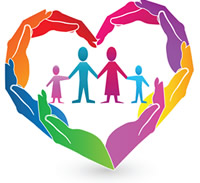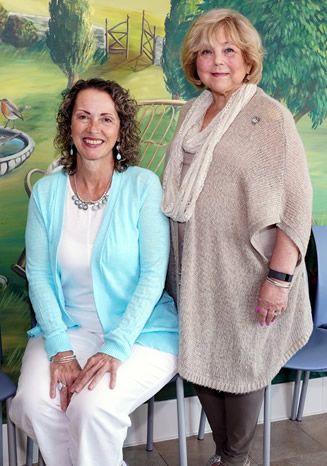A cancer or serious blood disorder diagnosis is a life-changing event, especially in the pediatric population. Understanding and identifying risks for psychosocial adjustment difficulties within families of children with cancer, considering changes across treatment and beyond, is very complex. How one perceives the events around a child’s cancer or serious blood disorder diagnosis may impact both short-term and long-term adaptation. Psychosocial interventions and support is well documented in the literature as having an affect on outcomes.
Our social workers play a vital, valuable and unique role in assessing and implementing interventions that assist patients and their families to cope during the diagnostic and treatment period and, often, beyond the treatment period. Both are licensed, clinical social workers. They offer their services both on an in-patient and out-patient basis affording the patient/family to have a consistent presence to guide them through their ordeal.
Our social workers provide a vital part of our multidisciplinary team. They provide counseling – individual and family, education, information services and referrals to community resources to the patients/families that they serve.
When a child is hospitalized, our social workers collaborate with the Child-Life and Creative Arts Therapy Program to provide well-rounded care designed to ease the burdens and increase the coping ability of patients and their families. Patients may also take part in our Integrative Therapies program, which provides massage, reiki, and tapping therapies.
Assessment is ongoing to address the various needs of the patient and family. Active, empathetic listening along with information sharing and appropriate problem-solving skills on the part of the social worker helps alleviate stress because the patient experiences loss of control, fear of the hospital environment, relapses, fear of dying, body image, low self esteem and issues related to reintegration into real-world situations. Engaging patients and families in this practice is part of the healing process.
Empowering those diagnosed during the difficult times they face encourages the resilient spirit of those served. To that end, our social workers assist patients/families improve their quality of life, cope with their fears and enable them to feel supported. Our social workers have knowledge and expertise in the social service system, employing their skills to provide information on matters related to insurance and referrals to agencies/programs that can provide financial assistance. Psychological services are assessed and addressed to assure the patient’s overall well-being.
Education is key to helping young people keep a sense of normalcy. Our social workers make appropriate referrals for patients to continue their studies while in the hospital and/or home.
Research and Education Highlights:
Pediatric Resident Rotation in Pediatric Pain and Palliative Medicine
Intensive training through Center to Advance Palliative Care 2010 with ongoing support.
Unique Features:
On-going evaluation and assessment to inpatients and outpatients facilitating continuity of care
Individual and Family counseling inpatients and outpatients
School and educational issues
Referrals to community support services
Assistance with insurance and financial issues
Bereavement and grief issues
Ronald McDonald House
Integrated Therapies
Family Centered Care
Multilingual Staff


